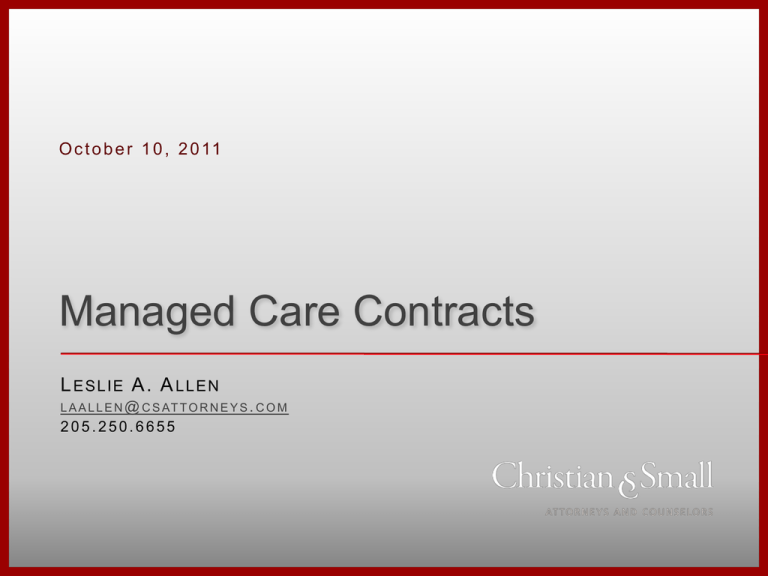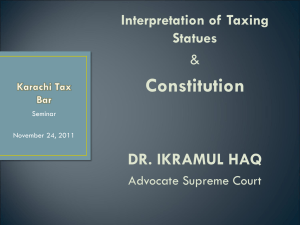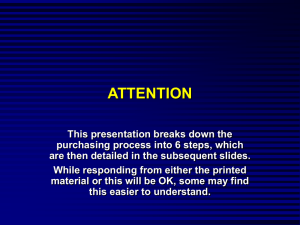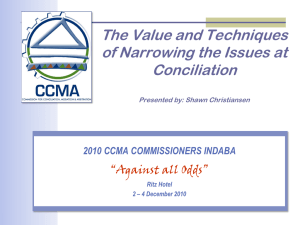PPT - Managed Care Contracts
advertisement

O c t o b e r 1 0 , 2 0 11 Managed Care Contracts L ESLIE A . A LLEN L A A L L E N @ C S AT T O R N E Y S . C O M 205.250.6655 I. Background: Managed Care • What do we mean by “managed care”? – Refers to health benefit plans that require discounts from the usual and customary charges of providers within their plans. – More restrictive plans cost less; and more flexible plans cost more. I. Background: Types of MCOs • Traditional health insurance companies • Health Maintenance Organizations (HMOs): Provides services to enrollees; usually only pays for care within the network. Selected PCP who coordinates care. • Preferred Provider Organizations (PPO): Pays more if patient gets care within the network; pays portion if the patient goes outside. • Point of Service (POS): Patient chooses between an HMO or a PPO each time need care is needed. • Alabama’s definition of HMO encompasses all types of these MCOs. I. Background: Types of MCOs • PPOs and POSs selectively contract with providers as “preferred providers.” Preferred providers provide a discount from their fees to the insurance plan. Discounts may be: – Percentages of billed charges. – Dictated by a certain fee schedule set forth by the insurance plan. • Providers traditionally agree to such discounts - guarantee of set volume of patients thought to overcome discounts. • Reality: discounts more to the insurer's advantage to lower payments. I. Background: Why Should You Care? • MCOs are increasing resource for provider payment for health services. Contracts must be closely scrutinized from many angles to ensure proper and maximum reimbursement. • Expansion of state managed care laws and regulations over past two decades. • Impact of managed care slower to develop within the field of anesthesiology; however, in the last 15 years, this trend is changing. I. Background: Why Should You Care? • Anesthesiology has been more insulated historically. – Anesthesiologists do not function as traditional gatekeepers to care, but this is changing secondary to pain management practices. – Anesthesiologists typically did not need to apply frequently for authorization consents. • Evolution of managed care and field of anesthesiology = direct impact presently. I. Background: Why Should You Care? • Every state and D.C. have managed care regulatory regimes – These are comprehensive and highly detailed. – Some aspects vary from state to state. – Some aspects standardized among the states. – Example: every state and D.C. have adopted “prompt pay” requirements specifying deadlines within which MCOs must process “clean claims” after receipt and impose penalties for noncompliance. I. Background: Why Should You Care? • MCO agreements presented to providers often do not comply with particular state legal requirements. – In some cases, there is a conflict with state legal requirements. – In other cases, a state may require specific language or provisions to be included in agreements that the MCO fails to incorporate or reference. – Agreements are increasingly supplemented with an “addendum,” but this is often difficult to reconcile with the provisions of the underlying contract. Overview of Discussion • Examine practical considerations relating to managed care contracts with anesthesiology practices that can impact the way you practice and reimbursement. • Look at particular provisions in managed care contracts that are potentially problematic from the perspective of providers. • Help you to identify these provisions if they appear in agreements offered to you. • Help you to understand the potential ramifications of these provisions and how they impact your practice. • Discuss more favorable language from the providers’ perspective to use with MCOs during negotiation of the contract. Overview of Discussion • DISCLAIMER – A brief overview - not intended to be comprehensive. – A VERY high level overview focused on just a few issues. • Call us with questions or if we can assist. II. Practical Considerations Do you get to choose which MCOs with which to contract? • Your contract with the hospital and/or ASC where you perform procedures should include a provision regarding managed care participation. • Some hospital contracts require participation with the same MCO contracts as the hospital. – You may be able to negotiate better terms, even if you are required to participate in all the same contracts as the hospital. II. Practical Considerations • The hospital agreement may require only best efforts toward participating with its MCO contracts. – This option often gives you more leverage in negotiations. – Good idea to have a close working relationship and communications with hospital administration regarding contracting and its managed care department. II. Practical Considerations • Typically the best option is to participate with those contracts in which the hospital participates. • Contracting with same MCOs as the hospitals and/or ASCs is not always possible if mutually beneficial terms cannot be agreed upon. II. Practical Considerations The New Role for Physicians in a Managed Care World • Providers in managed care plans may be encouraged to reduce the number of specialty referrals or lab tests. • Provider assumes the role of patient advocate and intermediary when dispute arises between your medical judgment and the MCO. • Examples…. II. Practical Considerations • Examples where the issue might arise for anesthesiologists: – A managed care plan has authorized only an outpatient procedure, but the patient develops a concerning arrhythmia in the recovery room and needs to be admitted; – A hurried (careless) surgeon refuses your request for a cardiology consultation because he/she dislikes the authorization process; – A managed care payer gives authorization only for a one-day admission to a non-monitored bed. II. Practical Considerations • Exercise independent medical judgment in the best interest of the patient, regardless of the influence of third-party payers. • Treatment must meet the same standard of care regardless of the nature of their health plans. • When disagreements occur, DOCUMENT every effort on behalf of the patient. – Keep detailed notes of explanations to patients and discussions with decision-making personnel at the MCO. • Provide optimal medical care and worry about reimbursement later. II. Practical Considerations Due Diligence in Negotiating the Managed Care Contract • Do your research about the MCOs with which you are considering contracting • Request copies of all documents that support or explain terms of the contract. Extra-contractual documents to request and review include: – provider policy and procedure manuals; – patient/subscriber plan documents; and – utilization and authorization procedures guidelines. – Should be reviewed BEFORE signing the contract. III. Managed Care Contract Provisions • Alabama requires HMOs to provide a set of basic services. Alabama also requires “provider contracts” to include the following provisions, among others: – The term, termination and renewal mechanisms; – Provisions for emergency services; – Payment/reimbursement methodologies described in layperson terms; (Good luck with that.) • (include specific reference to reimbursement in accordance with the American Society of Anesthesiologists (ASA) guidelines.) – A description of the utilization review program and provisions for provider participation in utilization review; and – Provisions for dispute mechanism. III. Managed Care Contract Provisions 1. Know the TERM of your contract. – “Term” refers to the period of time during which the agreement is effective. Typically, contracts have terms that range from 1-3 years. – For the provider, a contract term of 1 year is considered most favorable. – The contract’s actual duration may be longer or shorter than the specified term because of the TERMINATION and RENEWAL provisions. III. Managed Care Contract Provisions 2. Know TERMINATION provisions – TWO KINDS: with and without cause: • A. Can the MCO terminate the contract “without cause”? – Contracts may contain provisions that allow the MCO to terminate for any reason during the term. – Prior notice periods typically run from 60-120 days. – Some states regulate the use of without cause termination provisions. Some require reciprocity. – The preferred termination without cause provision should allow termination by EITHER PARTY with 120 DAYS NOTICE. III. Managed Care Contract Provisions B. Does the contract allow termination “with cause” in the event of a material breach? • What is the notice period for the with cause termination, and does it allow an opportunity to cure the breach? • How is with cause defined? • The preferred termination with cause provision should allow termination for cause by EITHER PARTY in the event of a MATERIAL BREACH with a 60-DAY PRIOR NOTICE PERIOD that allows the breaching party the OPPORTUNITY TO CURE. III. Managed Care Contract Provisions C. Know what DUE PROCESS, if any, the MCO is obligated to afford. • The contract may not include; ask for any extra-contractual documents that outline due process rights. • State law may require procedural due process. A number of states have specified the due process that must be provided by MCOs prior to termination: – Written notice that describes basis for termination; – Allowing access to any MCO documents supporting the termination; and – Providing the right to request a hearing to challenge. III. Managed Care Contract Provisions 3. Know the RENEWAL terms – Evergreen Provisions • Knowing when to renegotiate requires knowing the time of the contract’s renewal. • Be aware of EVERGREEN provisions that allow for automatic renewal by default. – Automatically renews at the end of the contract term, unless one party gives the other notice of nonrenewal. – Notice of nonrenewal often must be given within a specified time period prior to the end of the current term. III. Managed Care Contract Provisions • From the provider’s perspective, the preferred provision is an evergreen clause that automatically renews unless a party gives the other 120 DAYS NOTICE OF NONRENEWAL prior to the expiration of the term of the contract. III. Managed Care Contract Provisions 4. Pay attention to the contract’s definition of EMERGENCY SERVICES: • The preauthorization procedure required before performing services is not required for Emergency Services. • This definition is the basis for many payment disputes. – Emergency Services: • health care services provided in a hospital emergency department, freestanding emergency services facility, or comparable facility, to evaluate and stabilize a medical condition of a recent onset and severity, including severe pain, that would lead a prudent layperson possessing an average knowledge of medicine and health to believe that the person’s condition, sickness, or injury is of such a nature that failure to obtain immediate medical care could result in: (i) placing the person’s health in serious jeopardy; (ii) serious impairment to bodily functions; (iii) serious dysfunction of a bodily organ or part; (iv) serious disfigurement; or (v) in the case of a pregnant woman, serious jeopardy to the health of the fetus. III. Managed Care Contract Provisions 5. Know the criteria used to determine MEDICAL NECESSITY and what recourse you have to challenge denials. • Contracts usually state that you will be paid for providing “Covered Services.” There are at least two components that qualify as a Covered Service: – The service must be a benefit that is included within the patient/subscriber’s health benefit plan package. – The service must be medically necessary. • If the agreement does not define medical necessity, ask for any extra-contractual documents defining the term. III. Managed Care Contract Provisions To what extent can the MCO use cost considerations as part of the medical necessity criteria? • AMA strongly believes that cost factors should not influence medical necessity determinations. • A number of states statutorily define “medical necessity.” – Alabama does not. It does require HMOs to give a written denial response. III. Managed Care Contract Provisions The preferred definition of “medical necessity”/”medically necessary” in the managed care contract is as follows: – (i) appropriate and consistent with the diagnosis and the omission of which could adversely affect or fail to improve the eligible enrollee’s condition; – (ii) compatible with standards of acceptable practice; – (iii) provided in a safe and appropriate setting given the nature of the diagnosis and severity of symptoms; – (iv) not provided solely for the convenience of the patient/subscriber or the provider; and – (v) not primarily custodial care. III. Managed Care Contract Provisions Know the process for challenging the MCO’s determination that a service is not medically necessary. – State utilization review and independent external medical review regulatory schemes are complex. – Most states have adopted regulatory schemes imposing processes that MCOs must use to determine whether or not a service is medically necessary. – Federal ERISA regulations impose specific requirements on the manner in which ERISA plans process claims. – At least 44 states and D.C. have enacted laws allowing patients and/or providers to obtain an independent external medical review of a denial. • Bottom line: know the rights of you and your patients to seek an independent review. III. Managed Care Contract Provisions 6. Determine whether the managed care agreement contains an ALTERNATIVE DISPUTE RESOLUTION or ARBITRATION provision. • “Alternative dispute resolution” (ADR): process of resolving a dispute other than litigation in court. • Common forms of ADR are mediation and arbitration. – In mediations, a neutral third party (mediator) attempts to facilitate a mutually agreeable resolution. Mediations are almost always nonbinding. – Most contracts contain an arbitration provision, requiring the MCO and provider to resolve disputes through a binding arbitration proceeding. III. Managed Care Contract Provisions • Arbitration provisions more frequent than mediation provisions in managed care contracts. • Arbitrations require the parties to forfeit their rights to resolve disputes through litigation in courts, decided by a judge or a jury. • Arbitrations are quasi-judicial; parties call and cross examine witnesses, submit documentary evidence and engage in limited discovery; arbitrators have authority to issue subpoenas, which courts can enforce. • Parties are usually represented by legal counsel. III. Managed Care Contract Provisions Some believe there are benefits to arbitration when compared to litigation: • Quicker results. [Probably true.] • Less costly than litigation because the rules of evidence are relaxed and the processes are simplified. [That can depend.] • Arbitrations enable the parties to choose the decision maker. [True in theory, but it is the person that no party opposed.] • Arbitrations give parties more control over the timing and pace of the arbitration process. [Probably true, except court rules do also.] III. Managed Care Contract Provisions • Arbitration provisions are usually broadly worded to apply to any dispute “relating to” or “arising under” the managed care contract. • Arbitration proceedings are usually governed by rules and procedures of an external arbitration organization. • Commonly applied rules for arbitration: – – – – • The American Arbitration Association; JAMS; American Health Lawyers Association; or National Arbitration Forum. Make sure the arbitration provision specifies the rules to govern the proceeding. III. Managed Care Contract Provisions • Unless the contract provides otherwise, the fee for the arbitrator is divided equally. The MCO and provider are responsible for their own respective fees and costs incurred. – Provisions often provide that the “losing” party to the arbitration must pay the “prevailing” party its attorneys’ fees and costs. • Arbitration decisions are usually final because there is limited judicial review: – Exceptional circumstances; – When the decision shows a manifest disregard for the law; or – When the decision is against public policy. • In most circumstances, consider the arbitration decision final with no ability for appeal. III. Managed Care Contract Provisions Potential Problems with Arbitration Provisions: • The location specified for the arbitration. – Try to negotiate a location convenient to the provider or at least equally inconvenient for both parties. • Provisions prohibiting the joinder of parties and class arbitrations – Try to negotiate a provision that allows you to bring similar claims as part of one arbitration proceeding, even if you cannot join with other parties. • The time period to arbitrate disputes. – Provisions often require that disputes be submitted to arbitration within 1 year of the occurrence giving rise to the dispute. – Try to negotiate removal of any time limitation or at least negotiate a time period closer to the statute of limitations. At a minimum, negotiate to make the time limitation reciprocal for the MCO’s submission of disputes. III. Managed Care Contract Provisions • Limitations on the types and amounts of remedies. – Examples include prohibiting the recovery of punitive damages or capping damages awards. – If you cannot negotiate these restrictions out of the contract entirely, try to negotiate reciprocal restrictions on the MCO. • Arbitration panels to decide the dispute. – The use of a panel, instead of a single arbitrator, increases the cost for arbitrations significantly. – The use of a panel also often delays resolution because of increased likelihood of continuances and postponements. – When negotiating, consider trying to negotiate for a single arbitrator instead of a panel. III. Managed Care Contract Provisions 7. Be aware (and beware) of HOLD HARMLESS / INDEMNIFICATION provisions. – The provider agrees to hold harmless and/or indemnify the MCO from liability and expense, including attorneys’ fees, attributable to acts and omissions of the provider. – For example, if the MCO is named in malpractice lawsuit or government investigation involving the provider, then the provider is wholly responsible for any costs, expenses, damages or fines incurred by the MCO in responding to the lawsuit or investigation, so long as the amounts are attributable to the provider’s acts and omissions. • This applies even if the provider never engaged in any unlawful or noncompliant acts or omissions. III. Managed Care Contract Provisions • Most professional liability policies do not defend or indemnify an entity that is not a party to the policy – e.g., the MCO. • From the provider’s perspective, it is preferred that this kind of provision be removed from the contract entirely. – At the very least, the provision should be negotiated to make it reciprocal, so that the MCO has the obligation to indemnify and hold harmless the provider from all liability and expense attributable to the acts and omissions of the MCO. Resources • National Managed Care Contract (NMCC) Database Tool on the AMA Website (http://www.ama-assn.org/) (Requires AMA login) – Replaces the AMA Model Managed Care Contract, last updated in 2005. According to the AMA, that document was not based on state statutes and regulations but took an aspirational approach to the managed care contracting process. It can still be found on the internet - http://www.amaassn.org/ama1/pub/upload/mm/368/mmcc_4th_ed.pdf – I found the NMCC Database Tool useful for specific, isolated questions, but complicated for an overview of the subject of managed care contracts. Resources • American Society of Anesthesiologists website - http://www.asahq.org/ • Alabama health maintenance organizations, as defined by ALA CODE § 27-21A-1(7), are required to be regulated by the Alabama Department of Public Health. Those regulations are found at AL Regulations 420-56. Many requirements on MCOs are set forth in those regulations but are in addition to requirements from the Alabama Department of Insurance. • Klein JD. When will managed care come to anesthesia? J Health Care Finance 1997;23(3):62-86. • Motoyama E, Nenninger C. Managed health care and academic anesthesiology in the United States. J Anesth 2002;16:310-318. Lost? Bored? Don’t Want to Deal With It? Leslie A. Allen laallen@csattorneys.com 205.250.6655








